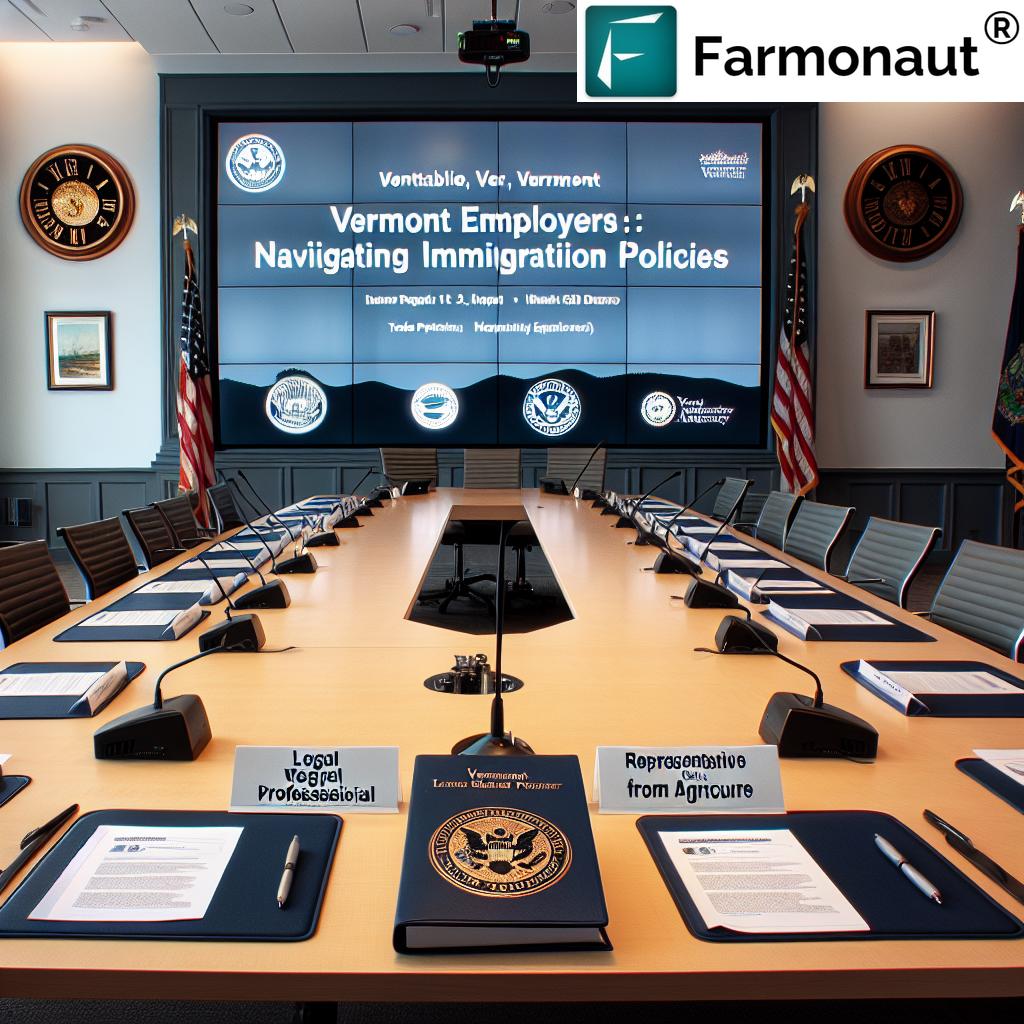Vermont Employers: Prepare for ICE Visits and Navigate Immigration Policies in Upcoming Webinar
“Vermont’s upcoming immigration webinar addresses ICE visits, impacting 2 key sectors: agriculture and housing.”
In the ever-evolving landscape of federal immigration policies, Vermont employers find themselves at a critical juncture. The need for clarity and guidance has never been more pressing, especially when it comes to understanding the rights and responsibilities during Immigration and Customs Enforcement (ICE) workplace visits. Recognizing this urgent need, a collaborative effort has been put forth to equip Vermont’s business community with essential knowledge and resources.
We are excited to announce an upcoming webinar that promises to be a game-changer for employers across the Green Mountain State. This timely event, scheduled for February 6 from 11 a.m. to 12:30 p.m., will address the pressing concerns surrounding ICE visits and the broader impact of federal immigration policies on Vermont’s economy.
The Collaborative Initiative
This crucial webinar is the result of a collaborative effort between Treasurer Mike Pieciak’s Task Force on the Federal Transition, the Vermont Chamber of Commerce, and Vermont Businesses for Social Responsibility (VBSR). By bringing together these influential organizations, the webinar aims to provide a comprehensive overview of the current immigration landscape and its implications for Vermont employers.
The event will consist of a one-hour moderated discussion followed by a 30-minute Q&A session, featuring top immigration experts from Vermont and across the nation. This format ensures that participants will have the opportunity to gain insights from seasoned professionals and have their specific questions addressed.
Understanding the Context
Treasurer Pieciak has expressed deep concern about the rising fear and confusion stemming from stringent federal immigration policies. These measures not only affect immigrant communities but also pose significant challenges to critical sectors of Vermont’s economy, particularly agriculture and housing, which heavily rely on immigrant labor.
- Impact on agriculture: Vermont’s farms and dairy industry depend on a stable workforce, many of whom are immigrants.
- Housing sector challenges: The construction and maintenance of Vermont’s housing stock often involve immigrant workers.
- Economic ripple effects: Changes in immigration policies can lead to labor shortages and increased costs for businesses and consumers.
Through this webinar, we aim to empower both employers and employees with the knowledge necessary to navigate potential ICE interactions effectively and legally.
The Volatile Regulatory Environment
Amy Spear, President of the Vermont Chamber of Commerce, has highlighted the volatile regulatory environment that employers must navigate. This webinar serves as a beacon of clarity in these uncertain times, offering resources and insights that will enable employers to better understand their legal rights and obligations.
Key areas of focus include:
- Recent changes in federal immigration policies
- Impact of these changes on Vermont businesses
- Legal responsibilities of employers during ICE visits
- Best practices for protecting employee privacy
Addressing Employer Uncertainties
Roxanne Vought, Executive Director of VBSR, has pointed out that many businesses are now grappling with newfound uncertainties surrounding federal immigration policies. The webinar aims to address these concerns head-on, providing clear guidance on:
- What is expected of employers during ICE visits
- How to adequately prepare for possible ICE interactions
- Essential privacy resources to safeguard the rights of both employers and workers
By equipping employers with this vital information, we hope to foster a more secure and informed business environment across Vermont.
The Task Force’s Proactive Approach
Recognizing the necessity of a proactive approach, Treasurer Pieciak convened his Task Force to address the economic implications of new federal policies. Immigration was identified as a primary concern, given Vermont’s tight labor market and the significant contributions of immigrant workers to the state’s economy.
This initiative signifies Vermont’s commitment to:
- Fostering an informed workforce
- Understanding the integral role of diversity in the economic framework
- Preparing businesses for potential challenges related to immigration policies

Expert Panel: Navigating the Immigration Landscape
The webinar will feature a distinguished panel of experts, each bringing unique insights and experiences to the table:
- Sue Minter: Co-chair of the Task Force and former director of disaster recovery
- Jill Martin-Diaz: Representative from the Vermont Asylum Assistance Project
- Attorney Kelli Duehning: Legal expert in immigration law
- Nicole Killoran: Law expert specializing in employment and immigration issues
- Jonathan Rose: Representative from the Attorney General’s Office
- Mike Webster: Community leader from the Association of Africans Living in Vermont
This diverse panel will provide a comprehensive overview of the current immigration landscape, offering practical advice and strategies for Vermont employers.
Key Topics to be Covered
“Expert panelists will discuss 3 crucial topics: changing regulations, ICE interaction preparation, and employee privacy protection.”
The webinar will delve into several critical areas that are of paramount importance to Vermont employers:
- Understanding Federal Immigration Policies: An overview of recent changes and their impact on Vermont businesses.
- Employer Rights and Responsibilities: Detailed explanation of what employers can and cannot do during ICE visits.
- Preparing for ICE Workplace Visits: Step-by-step guidance on how to prepare your business and employees.
- Protecting Employee Privacy: Best practices for safeguarding sensitive information and maintaining trust.
- Economic Impact of Immigration Policies: Analysis of how these policies affect Vermont’s key industries and overall economy.
- Resources and Support: Information on available resources for employers navigating immigration-related challenges.
Importance of Employer Preparedness
Being prepared for potential ICE visits is not just about compliance; it’s about protecting your business, your employees, and your community. Here’s a comprehensive checklist to help employers prepare:
| Preparation Area | Recommended Actions | Importance Level |
|---|---|---|
| Document Management |
– Organize and maintain up-to-date I-9 forms – Regularly audit employment records – Securely store all immigration-related documents |
High |
| Employee Privacy Protection |
– Implement strict data protection policies – Train staff on privacy protocols – Limit access to sensitive employee information |
High |
| Legal Rights Awareness |
– Educate management on legal rights during ICE visits – Consult with immigration attorneys – Develop a clear understanding of warrant requirements |
High |
| Communication Protocols |
– Establish clear communication channels for ICE visit scenarios – Designate specific personnel to interact with ICE agents – Prepare multilingual information for employees |
Medium |
| Resource Allocation |
– Allocate budget for legal consultations – Invest in employee training programs – Develop contingency plans for potential workforce disruptions |
Medium |
By following this checklist, Vermont employers can significantly enhance their preparedness for potential ICE interactions, ensuring they can navigate these situations with confidence and in compliance with the law.
The Role of Technology in Immigration Compliance
In today’s digital age, technology plays a crucial role in helping businesses stay compliant with immigration laws and manage their workforce efficiently. While not directly related to ICE visits, innovative solutions can assist in various aspects of employment and resource management.
For instance, companies like Farmonaut offer advanced management solutions that can be valuable for businesses in the agricultural sector. While Farmonaut’s primary focus is on agricultural technology, its principles of efficient resource management and data-driven decision-making can be applied to various business operations, including workforce management.
- Data Management: Efficient organization of employee data and documents.
- Resource Optimization: Better allocation of workforce based on business needs.
- Compliance Tracking: Automated systems to ensure up-to-date compliance with regulations.
For businesses interested in exploring technological solutions for resource management, you can check out Farmonaut’s offerings:
While these tools are primarily designed for agricultural management, the principles of efficient data handling and resource optimization can be valuable for any business dealing with complex regulatory environments.
Economic Impact of Immigration Policies
The webinar will also delve into the broader economic implications of federal immigration policies on Vermont’s economy. Understanding these effects is crucial for businesses to adapt and thrive in the changing landscape.
- Labor Market Dynamics: How immigration policies affect the availability of workers in key sectors.
- Industry-Specific Impacts: Detailed analysis of effects on agriculture, housing, and other vital Vermont industries.
- Long-term Economic Projections: Expert insights on how current policies might shape Vermont’s economic future.
Fostering a Supportive Business Environment
Vermont’s initiative to host this webinar reflects a commitment to fostering a supportive and informed business community. By providing employers with the knowledge and tools they need to navigate complex immigration policies, the state is taking proactive steps to:
- Protect the rights of both employers and employees
- Maintain a stable and diverse workforce
- Ensure compliance with federal regulations
- Promote economic stability and growth
This approach not only benefits individual businesses but also contributes to the overall economic health and social fabric of Vermont.
Post-Webinar Resources
Recognizing the ongoing nature of these challenges, the organizers have ensured that the valuable information shared during the webinar will remain accessible. After the event, a recording of the webinar will be made available on the Task Force’s website, allowing for continued access and reference.
Additional resources that will be provided include:
- Downloadable guides on employer rights and responsibilities
- Contact information for legal and community support services
- Regular updates on changes in federal immigration policies
- Access to expert consultations for specific queries

The Broader Context: Immigration and Innovation
While the webinar focuses on the immediate concerns of ICE visits and compliance, it’s important to consider the broader context of immigration in Vermont’s economy. Immigrants often bring diverse skills, entrepreneurial spirit, and innovative ideas that can drive economic growth and development.
For instance, in the agricultural sector, which is crucial to Vermont’s economy, innovative approaches to farming and resource management are becoming increasingly important. Companies like Farmonaut, while not directly involved in immigration matters, exemplify how technology can transform traditional industries. Their satellite-based farm management solutions offer insights into how businesses can leverage technology to optimize operations and stay competitive in a changing world.
Community Engagement and Support
The success of this initiative relies not just on the information provided but also on the active engagement of Vermont’s business community. Employers are encouraged to:
- Attend the webinar and actively participate in the Q&A session
- Share the information with their networks and industry associations
- Provide feedback to help shape future resources and initiatives
- Engage with local immigrant communities to foster understanding and collaboration
By coming together as a community, Vermont businesses can create a more resilient and inclusive economic environment that benefits all residents.
Looking Ahead: The Future of Immigration and Vermont’s Economy
As Vermont navigates these complex immigration issues, it’s clear that the state is committed to finding balanced solutions that support both businesses and immigrant communities. The upcoming webinar is just one step in an ongoing process of education, adaptation, and community building.
Looking to the future, Vermont employers should:
- Stay informed about changes in federal and state immigration policies
- Continuously update their knowledge and practices regarding workplace compliance
- Explore innovative solutions for workforce management and business operations
- Engage in ongoing dialogue with policymakers and community leaders
By staying proactive and informed, Vermont businesses can not only navigate the current challenges but also position themselves for success in an ever-evolving economic landscape.
Conclusion: Empowering Vermont’s Business Community
The upcoming webinar on “Preparing for ICE Visits and Navigating Immigration Policies” represents a crucial step in empowering Vermont’s employers with the knowledge and tools they need to thrive in today’s complex regulatory environment. By addressing the immediate concerns surrounding ICE visits while also exploring the broader economic implications of immigration policies, this initiative demonstrates Vermont’s commitment to fostering a resilient, informed, and inclusive business community.
We encourage all Vermont employers to take advantage of this valuable opportunity. By participating in the webinar and utilizing the resources provided, businesses can better protect their interests, support their workforce, and contribute to the state’s economic vitality.
Remember, knowledge is power. In the face of changing federal policies and potential ICE visits, being prepared and informed is your best defense. Join us on February 6 to equip yourself with the insights and strategies needed to navigate these challenges successfully.
Together, we can build a stronger, more resilient Vermont economy that benefits all residents, regardless of their background.
FAQs
- Q: Who should attend this webinar?
A: This webinar is essential for all Vermont employers, especially those in industries heavily reliant on immigrant labor, such as agriculture and housing. - Q: How can I register for the webinar?
A: Registration details will be available through the Vermont Chamber of Commerce and VBSR websites. Keep an eye out for announcements. - Q: What if I can’t attend the live webinar?
A: A recording of the webinar will be made available on the Task Force’s website after the event. - Q: Will there be opportunities for questions during the webinar?
A: Yes, there will be a 30-minute Q&A session following the main presentation. - Q: Are there any costs associated with attending the webinar?
A: The webinar is being offered as a free resource to Vermont employers. - Q: How can I stay updated on future events and resources related to this topic?
A: Follow the Vermont Chamber of Commerce and VBSR on social media and subscribe to their newsletters for updates. - Q: Will the webinar cover industry-specific information?
A: While the webinar will provide general guidance, it will also touch on specific impacts on key Vermont industries like agriculture and housing. - Q: Is this webinar only about ICE visits, or will it cover broader immigration policy issues?
A: The webinar will cover both preparation for ICE visits and the broader impact of federal immigration policies on Vermont’s economy. - Q: Will there be resources available in languages other than English?
A: Information on language accessibility will be provided closer to the event date. Check with the organizers for specific language support. - Q: How can I get involved in future initiatives related to this topic?
A: Reach out to the Vermont Chamber of Commerce or VBSR to express your interest in participating in or supporting future initiatives related to immigration and business in Vermont.
Earn With Farmonaut: Affiliate Program
Earn 20% recurring commission with Farmonaut’s affiliate program by sharing your promo code and helping farmers save 10%. Onboard 10 Elite farmers monthly to earn a minimum of $148,000 annually—start now and grow your income!





















